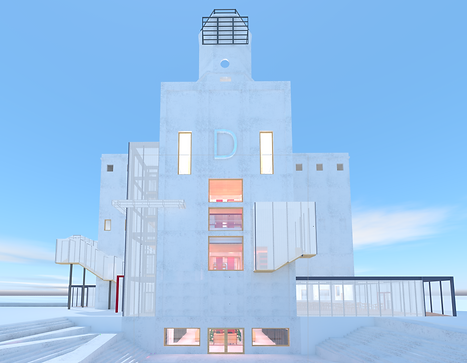‘IT’S A WONDERFUL LIFE’ -
MATERIALS BANK AT SILO D

The name ‘It’s a Wonderful Life’ comes from the 1946 Frank Capra film – a story of a seemingly bleak future which becomes overwhelmingly optimistic when a different perspective is taken. The importance of a community coming together for the collective alongside individuals having momentous impact is exhibited beautifully.
In 2019, the UK produced 206,450 tonnes of textile waste. This is the equivalent of 16,320 London buses.
73% of UK waste is burned or sent to landfill
12% is reused
9% is recycled
It is no surprise that finding data on how much textile waste the UK exports is difficult, but we know it ends up in places like Ghana’s Kantamanto Market in Accra. (The UK is the largest exporter to Ghana). The local economy is dependent on this market, however, there is still too much waste to handle.
The Magpie Project X Bethany Williams
The Magpie Project is based in Newham. They focus on supporting mothers of children under the age of 5, and keeping them out of homelessness.
They collaborated with designer, Bethany Williams, who’s work includes lines made form previous collection’s off-cuts, ends of rolls, and dead-stock.
This collaboration encourage a return to craft and skill building in a community driven environment.
New companies like Evrnu and Renewcell are sourcing garments with a high cellulose content, such as cotton and wool, dissolving them using chemicals in a controlled and environmentally friendly way, and then processing them back into a fibre which is made into fabric.
This closes the loop, but still operates on a large industrial scale, which uses intensive machinery, and they do not accept donations from the public.
When researching precedents that utilise the garment to garment model, it is apparent the idea is proposed as an innovation to be taken up by existing industrial chains and established companies.
This shifts the responsibility to such parties and creates distance from the consumer - preventing their involvement. A new relationship between consumer habits and the products they buy needs to be encouraged.
Full involvement with the entire manufacturing process should be readily available; from donating the textiles to purchasing the yarn or fabric after processing it. Such a space should be social and collaborative, as well as provide a space for a reflective and critical thinking of consumer habits so the contextualised norm can be challenged.
Charity shops are overwhelmed with clothing donations - a lot of donations end up in landfill. Silo D could be a place for excess donations, or donations not fit for sale, to be sent instead of being sent landfill or to be burned.
The Magpie Project, based in Newham, could source the fabric that their clients are taught to work with at Silo D. There will also be a space provided for community projects, and a workshop space for further development of skills
Both Ravensbourne University and UEL have fashion departments. The waste produced could be sent to Silo D. There is also an educational opportunity here; the proposal at Silo D will visualise closed loop design and address the issues of externalising our waste.


























